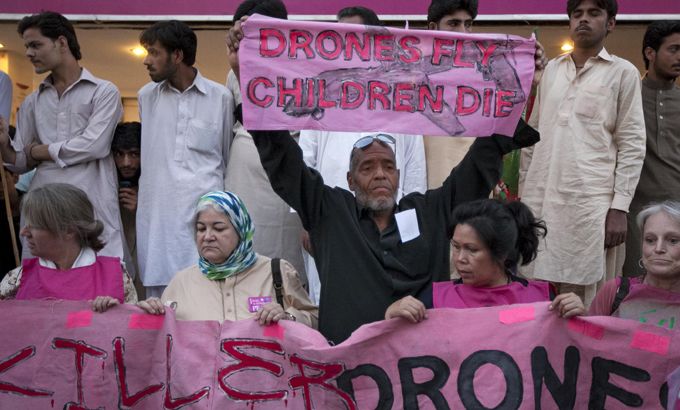Pakistan’s Khan leads rally against US drones
Dozens of US activists join Pakistani protesters led by Imran Khan as they attempt to march to restive tribal areas.

Pakistani cricketer-turned-politician Imran Khan has led Western activists and thousands of supporters on a defiant march to the tribal belt to protest against US drone strikes.
Cheering crowds lined the road on Saturday to greet Khan, scattering rose petals and heating drums as the convoy of more than 100 vehicles embarked on the 44-kilometre drive from the capital Islamabad to South Waziristan.
Khan and his supporters are calling for the US to stop targeting Pakistan’s northwest territories.
But as night fell, it appeared increasingly unlikely the protesters would be allowed to reach their destination, considered a Taliban and al-Qaeda stronghold, and often called the most dangerous place on earth.
The government says the Taliban plan to attack the rally. Authorities told the AFP news agency it was not safe for Khan to enter the semi-autonomous tribal belt and television broadcast footage of shipping containers closing the road into South Waziristan.
“I condemn the hypocrisy of the government, who tried their best to make this march fail,” Khan told around 5,000 supporters at a brief halt on the outskirts of the Punjab town of Mianwali, his former parliamentary seat.
“They are saying that Taliban have sent nine suicide attackers. If [President Asif Ali] Zardari sends even a 100 suicide attackers this march will not stop,” added Khan, who leads the Tehreek-e-Insaaf (PTI) or Movement for
Justice party.
Protest politics
Sohail Mahmoud, a political analyst, told Al Jazeera that Khan was using the issue of drones to his advantage.
“He’s doing it for politics. It’s a political statement,” he said.
Mahmoud pointed out that the government and all political parties in Pakistan opposed the US drone attacks before Khan started his march.
“So he’s just just playing to the public’s sentiments.”
Former foreign minister Shah Mehmood Qureshi, who defected from the main ruling party to PTI this year, insisted the march would not be a failure if the authorities stopped it from reaching Waziristan.
“The point is it’s symbolic,” he said.
“The government is saying we are against drones. The people are saying they are against drones. What are they afraid of? Why are they blocking us?”
Khan is accompanied by around 30 US campaigners from anti-war group CODEPINK and the British head of legal lobby organisation Reprieve, Clive Stafford Smith.
Medea Benjamin, co-founder CODEPINK, told Al Jazeera that her group participated in the march to show that there are Americans who are opposed to the drone strikes.
“And we hope that we’ll be putting pressure on our own government to take a look at the policy and see how inhumane [drones] are,” she said.
Drones ‘terrorise’ civilians
Critics of the strikes allege such attacks kill numerous innocent civilians and terrorise peaceful communities.
A report released last month by researchers from New York University and Stanford University found that the drones “terrorise” civilians living in the tribal areas.
The US rarely discusses the top-secret drone programme, but American officials have said the majority of those killed in the strikes are Pakistani Taliban and al-Qaeda fighters, and that the missiles used in the strikes are very precise.
According to the Bureau of Investigative Journalism, the US has launched more than 300 drone strikes in Pakistan in the last eight years, killing more than 2,500 people in North Waziristan alone.
Some estimates say a quarter of those were civilians, including children.
The American presence has buoyed organisers behind the protest but also added to concerns that certain groups will target the weekend event.
Ahead of the march, local media carried reports of alleged suicide bombings planned against the demonstrations, and a pamphlet distributed in a town along the march route warned participants they would face danger.